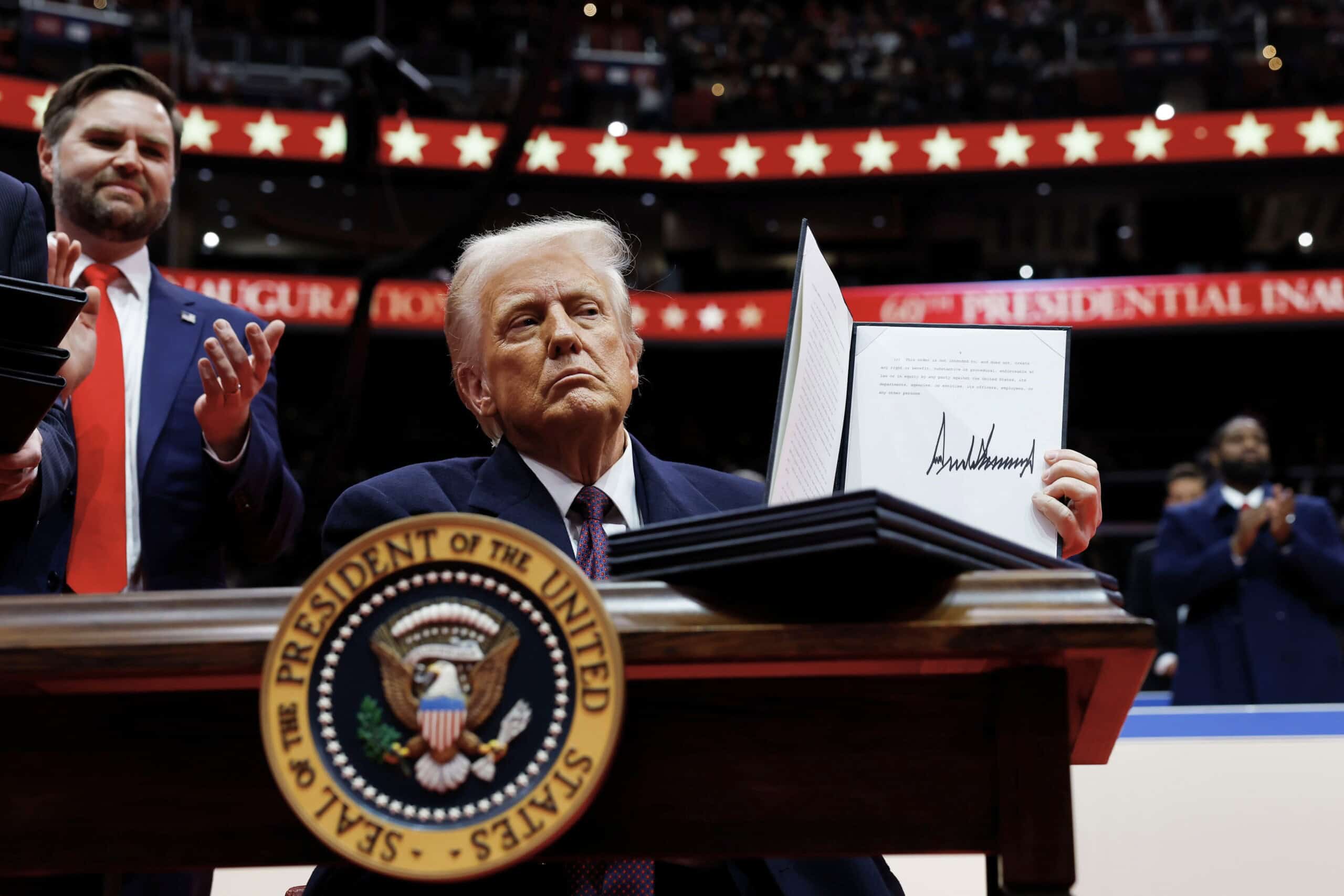
In this summer’s most eagerly-anticipated blockbuster, Barbie, the eponymous heroine and her beau Ken travel from their homes in Barbie Land to the human realm. In a surprising twist, the movie’s pink-hued plastic protagonists have created a real-world geopolitical controversy along the way.
An image from the movie’s trailer shows Margot Robbie, playing Barbie, standing in front of a world map on which two curved broken lines are drawn next to a land mass labeled ‘Asia’. Those markings have alarmed viewers in Southeast Asia, who see them as representing the so-called ‘nine-dash line’ — a visual shorthand for Beijing’s heavily disputed claims over territory across the South China Sea.
That alarm has provoked a response in countries concerned about China’s ambitions: in 2016, the Permanent Court of Arbitration at The Hague unanimously rejected the nine-dash line map, declaring Beijing’s claims illegal. Vietnam’s cinema regulator has banned Barbie from domestic distribution, according to state newspaper Tuoi Tre, while the Philippines’ movie classification board allowed the film only after a lengthy review.
[Hollywood studios] succumbed in many ways to what the Chinese government demanded so early on. As long as China has an authoritarian government… these changes will remain in place.
Robert Cain, a film producer and consultant who has worked with studios to get their movies into the Chinese market
Warner Bros., the movie studio behind Barbie, issued a statement to Reuters claiming the map is devoid of political subtext. Even so, the controversy points to a broader concern in Southeast Asia and beyond, that it and other major Hollywood companies have been too ready to conform with Chinese demands over content in exchange for access to its massive movie market. Warner Bros. did not respond to The Wire’s request for comment.

The Barbie backlash in Vietnam and the Philippines also hints at a future in which major studios struggle to satisfy the conflicting demands of their international audiences, particularly as Beijing increases its efforts to use cinema as a means to propagate its worldview.
“[Hollywood studios] succumbed in many ways to what the Chinese government demanded so early on,” says Robert Cain, a film producer and consultant who has worked with studios to get their movies into the Chinese market. “As long as China has an authoritarian government… these changes will remain in place.”
Back in the 1990s, Hollywood studios were unafraid of making movies that would violate Chinese censorship rules. In 1997, three different studios released blockbusters with themes critical of China: Columbia TriStar’s Seven Years in Tibet, starring Brad Pitt, and Disney’s Kundun, directed by Martin Scorsese, were both set in Tibet, while MGM’s Red Corner depicted a wrongful conviction in the Chinese justice system. In response, Beijing banned actors and directors from all three films from visiting China.
But as the Chinese economy grew, the nation became an increasingly powerful player in the international movie market, allowing the demands of its moviegoers — and censors — to alter Hollywood’s approach.

Data: Gower Street Analytics
In both 2020 and 2021 China’s box office overtook the North American market, according to figures from Gower Street Analytics, a London-based market data firm, although it finished 2022 in second place, with sales of $4.33 billion compared with North America’s $7.5 billion. With the end of Beijing’s zero-Covid policy, Gower Street predicts the Chinese box office could expand to $6.8 billion this year.
The list of most popular foreign box office releases in China is littered with franchise action films, including Avengers: Endgame and The Fate of the Furious. Both movies grossed hundreds of millions of dollars in China, according to data from EntGroup’s China Box Office, vital to them recouping their enormous expenses.
The broader pattern of China’s investment-driven growth has enhanced its prominence in the global movie market. Between 2009 and 2019, the number of movie screens in China increased by a factor of 15 to nearly 70,000, data from China’s National Radio and Television Administration shows.
“Their theaters are a huge part of their real estate development economy,” says Chris Fenton, a longtime film producer and the author of Feeding the Dragon: Inside the Trillion Dollar Dilemma Facing Hollywood, the NBA, and American Business. “They’re cornerstones of major industrial and commercial and residential areas of major cities.”
Hollywood discovered the extent of Beijing’s might soon after producing the 1997 movies. Hoping to open Disney theme parks in Hong Kong and Shanghai, Disney’s then-CEO Michael Eisner apologized to China’s former premier, Zhu Rongji, for releasing Kundun, terming it a “stupid mistake,” according to a transcript of the meeting.
“A lot of the major studios today are divisions of much bigger conglomerates. And so it’s not just about making sure that you preserve access to the Chinese box office,” says Erich Schwartzel, author of Red Carpet: Hollywood, China, and the Global Battle for Cultural Supremacy. “It’s making sure that your ‘offending element’ doesn’t become radioactive in a way that threatens the larger corporate parent.”
China has made it clear that they want the version of the movie shown in China to be the global version. …it also turns the Hollywood movie into a de facto commercial for the regime’s view of the world.
Erich Schwartzel, author of Red Carpet: Hollywood, China, and the Global Battle for Cultural Supremacy
Movie financing also plays a role. Chinese investment in the U.S. entertainment, media, and education sectors was virtually nonexistent before 2011, but totalled $3.33 billion in 2020, according to the Rhodium Group’s China Investment Monitor. In 2016, Chinese conglomerate Dalian Wanda purchased Legendary Studios for $3.5 billion, four years after it had purchased a controlling stake in AMC Theatres.
Hollywood’s multi-layered financial reliance on China means studios may care little if appeasing Chinese sensibilities means offending regulators in Southeast Asia. The Philippines box office grossed $41 million last year, according to Box Office Mojo, while Vietnam’s has reached revenue of $46 million so far in 2023, according to Box Office Vietnam. Avengers: Endgame alone grossed $591 million during its release in China.

Still, the dilemmas posed by the Chinese market could become trickier as Beijing’s approach becomes more assertive. Rather than just demanding omissions from movies, the Chinese authorities now encourage the insertion of positive depictions of their country.
“China has made it clear that they want the version of the movie shown in China to be the global version,” says Schwartzel. “This allows them to ensure that Chinese audiences only see the version that they’ve approved, but it also turns the Hollywood movie into a de facto commercial for the regime’s view of the world.” In the case of Barbie, he adds, this means global audiences seeing the nine-dash line, in accordance with “Chinese propaganda.”
The bigger test for Hollywood studios will come if their efforts to comply with Chinese demands attract political scrutiny at home.
In April, Chris Fenton, who advises the House of Representatives’ Select Committee on China, organized an off-the-record dinner between its members and Hollywood studio executives. These executives may be worried that “[Committee chair] Mike Gallagher is going to call you in for a hearing and put you on TV and make you look un-American and you know, like some kind of traitor,” says Kal Raustiala, a law professor at UCLA who attended the dinner.

Isaiah Schrader is a DC-based summer staff writer at The Wire and a PhD candidate at Harvard University, where he researches China’s legal and economic history. His writing has appeared in the South China Morning Post, and he has contributed to the PBS NewsHour’s coverage of China. @isaiahmschrader



